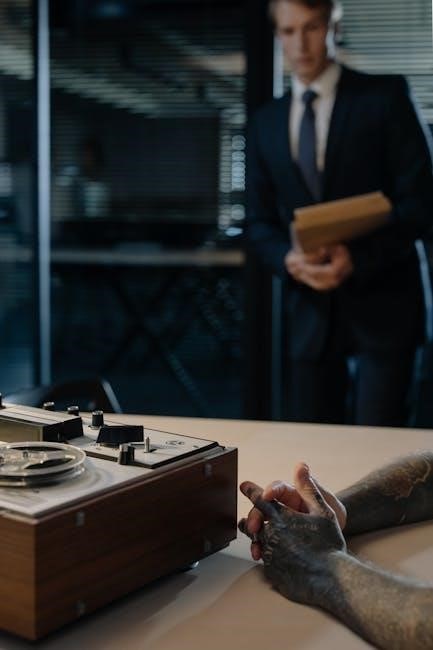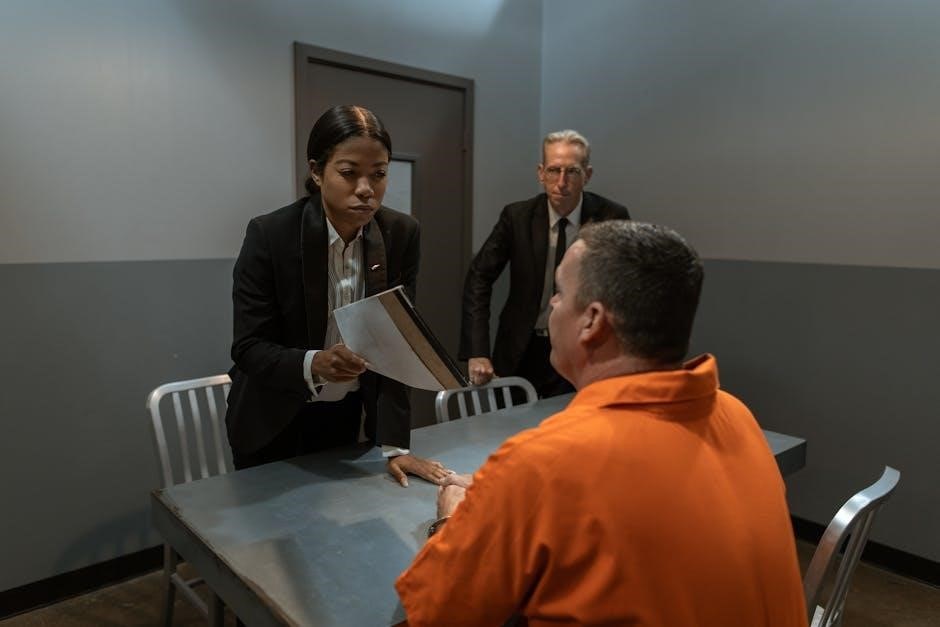Interrogation questions for suspects are carefully crafted to uncover facts, assess credibility, and determine involvement in criminal activities. These questions must balance ethical practices with investigative goals to ensure accurate and voluntary statements, avoiding coercion while respecting legal rights.
The Importance of Effective Questioning in Investigations
Effective questioning is crucial for uncovering facts, assessing credibility, and determining involvement in criminal activities. It involves using open-ended and non-leading questions to gather detailed information while maintaining ethical standards. Investigators must balance the need for truth with the rights of suspects, ensuring statements are voluntary and not coerced. Proper techniques help avoid false confessions and ensure legal admissibility, making the process fair and reliable. Objectivity and professionalism are essential throughout.
Distinguishing Between Interviews and Interrogations
Interviews and interrogations are distinct investigative tools. Interviews are non-confrontational conversations aimed at gathering general information, often during the early stages of an investigation. Interrogations, however, are more structured and goal-oriented, focusing on obtaining detailed confessions or specific admissions of guilt. Unlike interviews, interrogations typically occur when evidence already links the suspect to the crime. Understanding this distinction is key to conducting fair and effective investigations while respecting legal boundaries and suspect rights.

Preparing for an Interrogation
Organizing the environment, ensuring comfort, and having necessary documents ready are crucial. A well-prepared setting fosters open communication and facilitates truthful responses effectively.
Understanding the Suspect’s Perception of Custody
Assessing whether the suspect feels in custody is critical, as it influences their cooperation and legal rights. A hostile environment can heighten anxiety, while a neutral setting may reduce resistance. Understanding their perception helps tailor the interrogation approach, ensuring compliance with legal standards and fostering voluntary engagement. This awareness is key to maintaining ethical practices and preventing potential legal challenges. Proper communication and clarity about their situation are essential for a fair process.
Planning and Preparation for the Interrogation Process
Thorough planning is essential for a successful interrogation. This includes reviewing case files, organizing questions, and anticipating potential responses. Investigators should prepare a structured outline to guide the conversation, ensuring key points are addressed. The environment should be set to minimize distractions and promote focus. Adequate preparation enhances the likelihood of obtaining accurate and reliable information while maintaining control over the process. Proper planning ensures efficiency and effectiveness in achieving interrogation objectives.
Ethical Considerations in Formulating Questions
Ethical questioning ensures fairness and respect for the suspect’s rights. Investigators must avoid coercive tactics, misleading statements, or manipulative techniques that could elicit false confessions. Questions should be clear, unbiased, and free from suggestion. It is crucial to respect the suspect’s right to remain silent and ensure voluntary participation. Ethical practices maintain the integrity of the interrogation process and uphold legal standards, preventing potential miscarriages of justice. Transparency and accountability are paramount.

Types of Questions Used in Interrogations
Interrogations utilize open-ended, leading, and behavioral assessment questions. Open-ended encourage detailed responses, leading guide the conversation, and behavioral assess credibility and truthfulness.
Open-Ended vs. Leading Questions
Open-ended questions encourage suspects to provide detailed responses, aiding investigators in gathering comprehensive information. Leading questions, however, suggest specific answers, potentially influencing responses. Both types serve distinct purposes: open-ended questions uncover narratives, while leading ones clarify inconsistencies. Effective interrogators balance these techniques to avoid bias while eliciting truthful and actionable details, ensuring the integrity of the investigation process.
Behavioral Assessment Questions
Behavioral assessment questions focus on evaluating a suspect’s actions, demeanors, and responses to uncover inconsistencies or deceptive patterns. These inquiries target specific behaviors, such as changes in body language or tone, to gauge credibility. By analyzing how suspects respond to probing about their conduct, investigators can better assess their potential involvement in the crime, aiding in building a more accurate and reliable case narrative during interrogations.
Follow-Up Questions to Clarify Inconsistencies
Follow-up questions are essential to address discrepancies in a suspect’s statements, ensuring clarity and consistency. These inquiries target specific contradictions or vague responses, prompting the suspect to elaborate or explain. By probing for additional details, investigators can uncover potential deception or omissions, helping to build a more accurate narrative of events. This approach strengthens the reliability of the information gathered during the interrogation process.
Strategies for Building Rapport
Strategies for building rapport involve active listening, empathy, and creating a comfortable environment to foster trust and cooperation by understanding the suspect’s perspective during interrogations.
Creating a Non-Threatening Environment
Creating a non-threatening environment involves setting a calm and neutral atmosphere, ensuring privacy, and avoiding aggressive tone or body language. This helps reduce anxiety, fostering openness and cooperation. A quiet, comfortable space free from distractions allows the suspect to focus on the conversation, making them more likely to provide accurate information. The interrogator’s demeanor should be professional yet approachable, encouraging honest dialogue and mutual respect, which is essential for effective communication and truthful responses.
Active Listening Techniques
Active listening is crucial for effective communication during interrogations. Investigators should maintain eye contact, avoid interruptions, and use verbal cues like nods or brief acknowledgments. Paraphrasing the suspect’s statements ensures understanding and shows attentiveness. Reflective listening techniques, such as mirroring phrases, help build rapport and encourage detailed responses. These methods foster a collaborative environment, increasing the likelihood of obtaining accurate and truthful information while maintaining the suspect’s cooperation throughout the process.
Maintaining Objectivity and Professionalism
Maintaining objectivity and professionalism is essential during interrogations to ensure fairness and accuracy. Investigators must remain neutral, avoiding personal biases or emotional reactions. Professionalism fosters trust, encouraging suspects to cooperate. Using respectful language and tone helps de-escalate tension. Objectivity ensures that conclusions are based on evidence rather than assumptions, while professionalism upholds ethical standards and legal integrity, safeguarding the integrity of the investigation and its outcomes.

Techniques to Elicit Truthful Responses
Techniques to elicit truthful responses include creating a non-confrontational environment, using active listening, and employing open-ended questions to encourage detailed accounts. These methods foster cooperation and candor.
- Non-confrontational approach reduces defensiveness.
- Active listening builds rapport and trust.
- Open-ended questions encourage honest disclosure.
Using Non-Coercive Methods
Non-coercive methods focus on creating a calm, respectful environment to encourage honest responses. Techniques include active listening, open-ended questions, and avoiding intimidation. These approaches reduce anxiety, fostering willingness to cooperate. By building trust, investigators can gather accurate information without resorting to pressure or force, ensuring compliance with ethical standards and legal requirements.
- Creating a calm atmosphere.
- Using open-ended questions.
- Avoiding confrontational tactics.
Avoiding Bias and Assumptions
Avoiding bias and assumptions ensures objective questioning. Investigators must remain neutral, refraining from preconceived notions about a suspect’s guilt. Bias can lead to misleading conclusions, while assumptions may overlook critical details. Objectivity fosters accurate and reliable information, ensuring fairness in the process. by focusing on evidence and facts, investigators maintain the integrity of the interrogation and uphold justice.
- Remain neutral and impartial.
- Base questions on evidence.
- Avoid stereotyping or presumptions.
Encouraging Detailed Responses
Encouraging detailed responses involves creating an environment where suspects feel comfortable elaborating. Open-ended questions prompt thorough explanations, while active listening and non-verbal cues like nodding or maintaining eye contact show engagement. Avoid interrupting and allow time for the suspect to reflect. Paraphrasing and summarizing statements can clarify intent and encourage further disclosure, ensuring a comprehensive understanding of their perspective.
- Ask open-ended questions to prompt elaboration.
- Use active listening to show engagement.
- Paraphrase to clarify and encourage further detail.

Common Mistakes to Avoid
Common interrogation mistakes include poor preparation, aggressive tactics, and failure to listen actively. These errors can compromise the integrity of the investigation and lead to false confessions.
- Poor preparation can lead to irrelevant questioning.
- Aggressive tactics often result in unreliable statements.
- Failure to listen actively may miss critical details.
The Risks of Coercive Questioning
Coercive questioning often leads to false confessions, undermining investigation integrity. It can make suspects resistant to providing accurate information and damage trust. Such tactics may violate legal standards, resulting in inadmissible evidence; Additionally, coercive methods can escalate stress, increasing the likelihood of unreliable statements. Investigators must avoid high-pressure techniques to ensure voluntary and truthful responses, maintaining ethical and legal boundaries throughout the interrogation process.
Leading Questions and Their Consequences
Leading questions suggest specific answers, potentially influencing suspects’ responses. They can create false confessions or distort facts, compromising investigation accuracy. Overreliance on such questions risks producing unreliable testimony, undermining case credibility. Investigators must avoid them to ensure unbiased and voluntary statements. Using neutral, open-ended questions helps gather truthful information and maintains the integrity of legal proceedings, ensuring justice is served fairly and ethically.
Overlooking Inconsistencies in Statements
Overlooking inconsistencies in a suspect’s statements can lead to flawed conclusions and missed opportunities to uncover the truth. Investigators must actively listen for contradictions and probe further to clarify discrepancies. Failing to address inconsistencies can result in incorrect assumptions, wasted investigative resources, and potentially allowing guilty individuals to evade accountability. Consistent follow-up questioning ensures a thorough and accurate understanding of the suspect’s narrative, maintaining the integrity of the investigation.

Documenting the Interrogation
Accurate documentation ensures accountability and transparency, providing a reliable record of the interrogation process for legal proceedings and future reference, supporting investigation integrity and fairness.
The Importance of Recording the Process
Recording interrogations ensures transparency, accountability, and accuracy, providing a verifiable record of statements made. This practice supports legal admissibility, protects suspect rights, and maintains investigator credibility. It also allows for post-interrogation analysis to identify potential errors or improvements, ensuring fairness and integrity in the process. Modern tools facilitate high-quality recordings, which are invaluable for court proceedings and internal reviews, enhancing the reliability of evidence and safeguarding justice.
Summarizing and Finalizing Statements
Summarizing and finalizing statements ensures clarity and accuracy, preventing misunderstandings. This step involves compiling key points from the interrogation, verifying facts, and organizing information logically. It helps in preparing concise reports for legal proceedings, ensuring the suspect’s statements are accurately represented. Allowing the suspect to review and correct the summary promotes transparency and fairness, while also safeguarding the integrity of the investigation process and its outcomes.
Storing Evidence for Legal Proceedings
Securely storing evidence from interrogations is crucial for legal proceedings. Digital recordings, transcripts, and notes must be stored in encrypted, tamper-proof databases. Physical evidence should be kept in sealed, labeled containers within secure facilities. Access should be restricted to authorized personnel with audit trails to prevent tampering. Proper storage ensures evidence integrity, maintaining its admissibility in court. This step is vital for upholding justice and avoiding potential legal challenges or miscarriages of justice due to mishandled evidence.

Legal and Ethical Considerations
Ensuring Miranda rights are upheld, obtaining voluntary statements, and avoiding coercive tactics are critical. Ethical interviewing practices protect both the suspect’s rights and the integrity of investigations.
Ensuring Voluntary Statements
Ensuring voluntary statements involves creating a non-threatening environment where suspects feel free to speak without coercion. Investigators must avoid tactics that could compel false admissions. Open-ended questions and transparent procedures foster trust, reducing the likelihood of involuntary confessions. Documenting the process and ensuring suspects understand their rights are essential. This approach aligns with legal and ethical standards, safeguarding both the suspect’s rights and the investigation’s integrity.
Understanding Miranda Rights
Miranda Rights are a legal requirement in the U.S., ensuring suspects are aware of their rights during custodial interrogation. The Miranda Warning informs individuals of their right to remain silent, that anything said can be used against them, and their right to an attorney. Understanding these rights is crucial for investigators to ensure statements are voluntary and not coerced, aligning with legal standards and protecting both the suspect and the integrity of the investigation.
Avoiding False Confessions
Avoiding false confessions is critical to ensure the integrity of an investigation. Techniques like non-coercive questioning, transparency, and avoiding suggestive language help prevent erroneous admissions. Investigators should remain neutral, allow suspects to provide detailed accounts, and verify inconsistencies. Recording interrogations and maintaining a fair process further reduce the risk of false confessions, safeguarding justice and upholding the suspect’s rights throughout the process.
Debriefing and Follow-Up
Debriefing involves reviewing the interrogation process to gather insights, verify information, and document lessons learned. Follow-up ensures leads are pursued and evidence is securely stored for further analysis.
Reviewing the Interrogation Process
Reviewing the interrogation process involves evaluating the effectiveness of questioning techniques, assessing the suspect’s responses, and identifying inconsistencies. This step ensures transparency, accountability, and continuous improvement. By analyzing what worked well and what didn’t, investigators can refine their strategies for future interrogations. Additionally, this review helps in verifying the accuracy of information gathered and addressing any potential oversights or errors made during the process.
Verifying Information and Leads
Verifying information and leads ensures the accuracy and reliability of the evidence gathered during an interrogation. Investigators cross-reference statements with physical evidence, witness accounts, and forensic data. This step helps identify discrepancies and strengthens the case by confirming the credibility of the suspect’s responses. Thorough verification also prevents reliance on misleading or false information, ensuring that all leads are pursued based on factual and corroborated details.
Documenting Lessons Learned
Documenting lessons learned after an interrogation is crucial for improving future techniques and ensuring accountability. Investigators should record what worked well and what didn’t, identifying areas for refinement. This documentation helps in developing best practices and training materials. By capturing insights from each session, teams can enhance their skills and adapt strategies to achieve better outcomes in subsequent interrogations. Continuous improvement relies on these documented experiences.

Training and Best Practices
Effective interrogation training emphasizes continuous skill refinement, ethical practices, and adherence to legal standards. Regular workshops and case studies ensure investigators stay updated and proficient in techniques;
Continuous Improvement in Interrogation Skills
Continuous improvement in interrogation skills requires ongoing education, practical training, and feedback. Investigators should engage in regular workshops, peer reviews, and case analyses to refine techniques. Incorporating new methodologies and staying updated on legal and ethical advancements ensures interrogators remain effective and professional. Regular skill assessments and real-world application of strategies help maintain high standards and adaptability in diverse investigative scenarios.
Case Studies and Practical Examples
Analyzing real-life case studies and practical examples enhances interrogation skills by providing insights into effective questioning techniques. These examples demonstrate how to navigate complex scenarios, identify deception, and elicit truthful responses. Practical demonstrations of open-ended and behavioral questions illustrate their application in real investigations. Reviewing successful and unsuccessful interrogations offers valuable lessons, helping investigators refine their approaches and improve outcomes in future cases.
Annual Refresher Courses
Annual refresher courses are crucial for maintaining and enhancing interrogation skills. These courses update investigators on the latest techniques, legal standards, and ethical practices. They provide hands-on training and case discussions to refine questioning strategies. Regular refreshers ensure investigators stay informed about evolving laws and best practices, fostering professionalism and effectiveness in conducting interrogations.

Cultural and Individual Factors
Cultural and individual differences significantly impact interrogation dynamics. Understanding a suspect’s background, values, and communication style is essential for effective questioning. Tailoring approaches to these factors ensures fairness and accuracy, fostering trust and cooperation during the process.
Understanding the Suspect’s Background
Understanding the suspect’s background is crucial for effective interrogation. Cultural, social, and personal factors influence behavior and communication. Knowledge of their upbringing, experiences, and values helps tailor questioning strategies. This insight ensures cultural sensitivity, reduces misunderstandings, and builds rapport. Recognizing background elements also aids in identifying potential deception or emotional triggers, enabling investigators to adapt their approach for more accurate and reliable results during the interrogation process.
Adapting Techniques for Different Personality Types
Adapting interrogation techniques to suit different personality types enhances effectiveness; Introverts may require patience and gentle probing, while extroverts might respond to direct, engaging questions. Understanding whether a suspect is analytical, emotional, or aggressive helps tailor the approach. Active listening and empathy build rapport, fostering cooperation. Mirroring communication styles and adjusting tone ensures clarity and reduces defensiveness, leading to more truthful and reliable responses during the interrogation process.
Cultural Sensitivity in Questioning
Cultural sensitivity is crucial in interrogation to avoid misunderstandings and ensure effective communication. Investigators must be aware of cultural nuances, such as non-verbal cues and language barriers, to build trust. Tailoring questioning strategies to the suspect’s cultural background fosters cooperation and accuracy. Respecting cultural differences prevents misinterpretation of responses, ensuring a fair and ethical process. This approach promotes truthful disclosures and maintains the integrity of the investigation.
Effective interrogation requires balancing strategy with ethical standards, ensuring clarity and fairness. Cultural sensitivity and psychological insight enhance truthful responses, guiding successful investigations while upholding justice.
Summarizing Key Takeaways
Effective interrogation hinges on preparation, ethical practices, and clear communication. Understanding the suspect’s mindset and employing non-coercive methods fosters truthful responses. Active listening, rapport-building, and avoiding bias are critical. Documenting processes ensures accountability and transparency. Legal awareness, including Miranda rights, prevents false confessions. Continuous training and cultural sensitivity enhance interrogation skills, leading to fair and reliable outcomes in investigations.
The Evolution of Interrogation Techniques
Interrogation methods have evolved significantly, shifting from coercive approaches to more ethical, evidence-based practices. Historical techniques often relied on intimidation, while modern strategies emphasize psychological insights and transparency. Advances in legal standards, Miranda rights, and cognitive research have reshaped questioning practices. Today, focus is on non-coercive methods, technology integration, and cultural sensitivity, ensuring fair and reliable outcomes. Continuous training and ethical standards now define effective interrogation practices.

Additional Resources
Explore additional resources, including downloadable guides, recommended readings, and practical tools, to enhance your understanding and application of effective interrogation techniques in investigations.
Downloadable PDF Guide
A comprehensive downloadable PDF guide on interrogation questions for suspects offers detailed insights, sample questions, and strategies for conducting effective interviews. It includes practical examples, legal considerations, and expert tips to enhance questioning techniques. The guide is designed for law enforcement, investigators, and legal professionals seeking to refine their skills. Download the PDF to access structured frameworks, case studies, and actionable advice for improving interrogation outcomes and ensuring compliance with ethical standards.
Recommended Reading and Further Study
For deeper insights into interrogation techniques, consider exploring books like The Art of Interrogation and Criminal Interrogation and Confessions. These resources provide in-depth strategies, real-life case studies, and expert viewpoints. Additionally, academic articles on forensic psychology and investigative interviewing offer evidence-based approaches to enhance questioning skills. These materials are invaluable for investigators, law enforcement, and legal professionals aiming to refine their interrogation methods and stay updated on best practices.